‘Policy choices’ blamed for homeless numbers
By Joe Locker,
Local Democracy Reporting Service
• Chris Doidge, BBC News, Nottingham
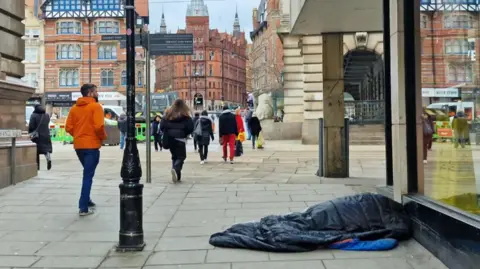
The city's homelessness problem has been described as an "acute crisis"
Policy choices over the last decade have led to record levels of rough sleeping in Nottingham, a leading charity claims.
A monthly headcount undertaken in June 2024 found 51 people were sleeping rough in the city, including 42 men and nine women, the highest June figure for a decade.
The boss of Framework, a homelessness support charity, blamed a lack of social housing and lack of access to mental health support and drug and alcohol addiction services.
The government said it would "take the action needed to tackle this issue" in order to "end homelessness for good".
During a Nottingham City Council housing scrutiny committee meeting on July 15, the issue was described as an “acute crisis”.
“Rough sleeping is the very visual side of homelessness... and we have people dealing with that,” said Mark Lowe, the council’s head of housing.
“For us the other aspect, and the aspect that costs most of our budget, relates to families and vulnerable people who are being evicted or are, for other reasons, losing their home.”

The city's homelessness problem has been described as an "acute crisis"
Policy choices over the last decade have led to record levels of rough sleeping in Nottingham, a leading charity claims.
A monthly headcount undertaken in June 2024 found 51 people were sleeping rough in the city, including 42 men and nine women, the highest June figure for a decade.
The boss of Framework, a homelessness support charity, blamed a lack of social housing and lack of access to mental health support and drug and alcohol addiction services.
The government said it would "take the action needed to tackle this issue" in order to "end homelessness for good".
During a Nottingham City Council housing scrutiny committee meeting on July 15, the issue was described as an “acute crisis”.
“Rough sleeping is the very visual side of homelessness... and we have people dealing with that,” said Mark Lowe, the council’s head of housing.
“For us the other aspect, and the aspect that costs most of our budget, relates to families and vulnerable people who are being evicted or are, for other reasons, losing their home.”
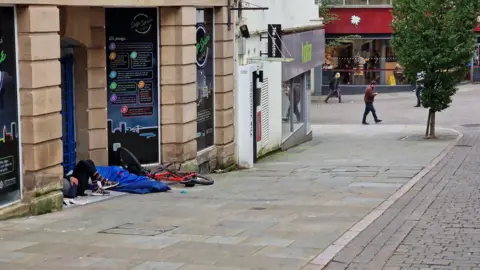
The high cost of renting a home in Nottingham is one of the issues, the council says
Nottingham City Council said it is the less visible side of homelessness that is the most significant issue – and one that costs it the most money.
Over the last year the use of emergency accommodation for homeless families and households more than doubled.
As of June, the council had been accommodating 235 households in emergency housing, such as hotels and bed and breakfasts, compared to 115 a year ago.
The total number of people in any form of temporary accommodation in March this year was 776, up from 599 people.
Features of the national and Nottingham housing market have worsened the crisis, Mr Lowe said.
These features include high rents in the private sector which are well above Local Housing Allowance (LHA) levels.
“It’s very hard for people on benefits to get enough money to pay for a private rented place to live,” Mr Lowe added.
The number of new homes built has also not been able to match the significant numbers lost through the Right-to-Buy scheme, the Local Democracy Reporting Service said.
Between 2019 and 2023, 988 homes were purchased through Right-to-Buy.
Over the same period, the council only managed to build or buy 374 affordable homes, and its registered providers only completed a further 126 homes.
'Making headway'
Jay Hayes, executive member for housing, said the costs of housing people in temporary accommodation was beginning to come down through better working with providers.
“So far this year we’ve been able to help 150 people into some form of accommodation.
“We are making headway there but there are still challenges.”
Andrew Redfern, chief executive of Framework, said the record numbers could be attributed to policy decisions taken over the last decade, including reduced social housing, restrictions on Local Housing Allowance, and cuts to public health services.
“Homelessness is a policy choice, and the choices made over recent years have made it much worse.
“It follows that different ones are needed now.
“Framework has sought to highlight all of these causes in the course of the recent general election campaign.
“We will continue to do so now that a new government has been elected."
Under the former Conservative government, Nottingham was awarded £20m to cover the period between 2021 and 2025, the highest amount of financial support outside London.
The new Labour government says it is looking to abolish no fault evictions to bring down the number of people losing their homes.
A spokesman for the Ministry of Housing, Communities and Local Government said: “Rough sleepers are an all-too-common sight in our towns and cities, including Nottingham.
“As set out in the manifesto, we will take the action needed to tackle this issue and will develop a cross-government strategy so we can work with mayors and councils to end homelessness for good.”
Rough sleepers 'abandoned' before being moved on
By Charles Heslett,
By Charles Heslett,
BBC News Online
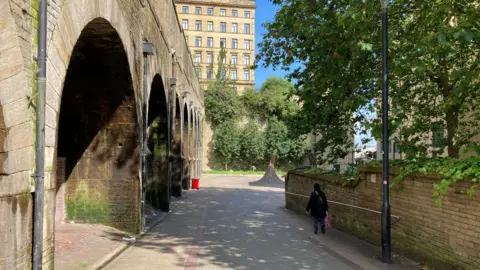

BBC
There are 10 archways which the council is proposing to gate off
A charity that helps the homeless has claimed that rough sleepers have been "abandoned" ahead of being moved on by council staff.
Homeless Not Helpless ran an outreach service close to a number of arches near Bradford Forster Square Station, where several tent encampments had sprung up.
Bradford Council decided to install gates on 10 of the railway arches to provide space for art installations as part of City of Culture 2025.
The charity agreed to relocate its volunteers to a car park, but said it would now return to the area because the work had not started on time.
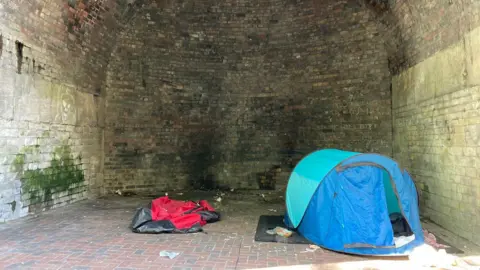
Many of the archways have tents inside them used by the city's rough sleepers
The group's Steve Richardson said the arches had been "abandoned by the council" and that it was having to step in and provide help for the remaining rough sleepers.
The council said that its own staff were making daily visits to the area to liaise with homeless people and refer them to support services.
Mr Richardson said: "These people are now getting less support than they were before.
"We agreed to move (from the arches) from 1 May on the understanding that it would trigger some additional support for the people sleeping down there and they would be progressively rehoused and given some assistance.
"The council's reneged on the deal.
"I know it has had financial difficulties and the people who work for the Homeless Outreach Partnership (HOP) are excellent; but it feels like the area has been abandoned.
"So we've taken the decision to move back down there."
Public realm
Under the plans, the arches along the walkway between Cheapside and Forster Square Station would have 3m-high (9.8ft) decorated panels, with new lighting inside.
The council said the changes would lead to a "much improved public realm" around the station.
Network Rail owns the arches and will fund the work, which was scheduled to start in May and be completed by late August.
When the BBC visited the site on Monday there were at least seven tents in various archways with wooden pallets and traffic cones being used to divide sleeping areas.
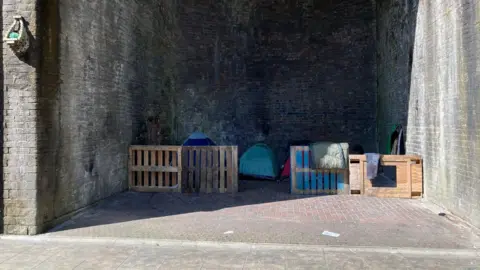
Many of the arches have become makeshift camps for the city's rough sleepers
Homeless army veteran James, 38, said he knew some of the people sleeping in the arches.
He said: "If they close them off then it's just going to be another headache for the council.
"They're just going to be pushing people back to the city centre and they're going to get complaints over and over again.
"I don't think it'll solve any issues straight away. But I think it'll be nicer for people walking back to the train station, as it does get a bit rowdy, especially at night."
Council involvement
Bradford Council's portfolio holder for regeneration, planning and transport, Councillor Alex Ross-Shaw, said: "Our Homeless Outreach Partnership is continuing to visit the Forster Square arches on a daily basis ahead of access to the area being withdrawn later this year.
"This a multi-agency team of professionals, including drug, alcohol, and complex needs workers, as well as specialists in housing options who are able to offer wraparound care to those who need it and to support them off the streets."
Mr Ross-Shaw added that the council wanted to support people to move away from "street-based" living and had offered accommodation to 225 people over the past year.
The arches are a surviving part of the original Victorian station, which was demolished and reduced in size in the 1990s.
There are 10 archways which the council is proposing to gate off
A charity that helps the homeless has claimed that rough sleepers have been "abandoned" ahead of being moved on by council staff.
Homeless Not Helpless ran an outreach service close to a number of arches near Bradford Forster Square Station, where several tent encampments had sprung up.
Bradford Council decided to install gates on 10 of the railway arches to provide space for art installations as part of City of Culture 2025.
The charity agreed to relocate its volunteers to a car park, but said it would now return to the area because the work had not started on time.

Many of the archways have tents inside them used by the city's rough sleepers
The group's Steve Richardson said the arches had been "abandoned by the council" and that it was having to step in and provide help for the remaining rough sleepers.
The council said that its own staff were making daily visits to the area to liaise with homeless people and refer them to support services.
Mr Richardson said: "These people are now getting less support than they were before.
"We agreed to move (from the arches) from 1 May on the understanding that it would trigger some additional support for the people sleeping down there and they would be progressively rehoused and given some assistance.
"The council's reneged on the deal.
"I know it has had financial difficulties and the people who work for the Homeless Outreach Partnership (HOP) are excellent; but it feels like the area has been abandoned.
"So we've taken the decision to move back down there."
Public realm
Under the plans, the arches along the walkway between Cheapside and Forster Square Station would have 3m-high (9.8ft) decorated panels, with new lighting inside.
The council said the changes would lead to a "much improved public realm" around the station.
Network Rail owns the arches and will fund the work, which was scheduled to start in May and be completed by late August.
When the BBC visited the site on Monday there were at least seven tents in various archways with wooden pallets and traffic cones being used to divide sleeping areas.

Many of the arches have become makeshift camps for the city's rough sleepers
Homeless army veteran James, 38, said he knew some of the people sleeping in the arches.
He said: "If they close them off then it's just going to be another headache for the council.
"They're just going to be pushing people back to the city centre and they're going to get complaints over and over again.
"I don't think it'll solve any issues straight away. But I think it'll be nicer for people walking back to the train station, as it does get a bit rowdy, especially at night."
Council involvement
Bradford Council's portfolio holder for regeneration, planning and transport, Councillor Alex Ross-Shaw, said: "Our Homeless Outreach Partnership is continuing to visit the Forster Square arches on a daily basis ahead of access to the area being withdrawn later this year.
"This a multi-agency team of professionals, including drug, alcohol, and complex needs workers, as well as specialists in housing options who are able to offer wraparound care to those who need it and to support them off the streets."
Mr Ross-Shaw added that the council wanted to support people to move away from "street-based" living and had offered accommodation to 225 people over the past year.
The arches are a surviving part of the original Victorian station, which was demolished and reduced in size in the 1990s.
No comments:
Post a Comment